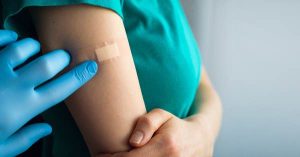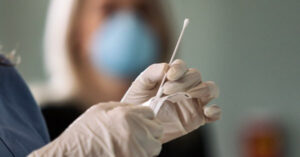COVID-19 vaccinated.
Now what?
Published: May 26, 2021
Congratulations on getting your COVID-19 vaccine! Now that you’re vaccinated, you likely have a lot of questions about what exactly that means. We’re here, to answer your questions and help you safely navigate your new normal.
When am I considered to be fully vaccinated?
First thing’s first. Are you fully vaccinated? According to the Centers for Disease Control and Prevention (CDC), a person is fully vaccinated two weeks after they receive their last vaccine dose. This means you’re fully vaccinated two weeks after receiving your one-dose Janssen (Johnson & Johnson) vaccine or two weeks after your second dose of the Pfizer-BioNTech or Moderna vaccine.
Remember, all of the FDA-approved COVID-19 vaccines are safe and highly effective at preventing infection. Side effects associated with the vaccines are typically mild and should resolve within a few days, these include:
- Soreness at the injection site
- Low-grade fever
- Body aches and chills
- Fatigue
- Nausea
- Headaches
What can I safely do after the COVID-19 vaccination?
Ok, you’re fully vaccinated. Now what? The major benefit of being fully vaccinated is that you can once again participate in activities you did before COVID—without worrying about becoming infected or infecting others. This means it’s safe for you to gather with family members and friends, dine out, go to a movie and attend a live concert. In short, your life will start to look more like it did before the pandemic.
Do I still need to wear a mask and socially distance?
In most cases, no. According to the CDC, once you are fully vaccinated you no longer need to wear a mask or socially distance. However, you may be required to continue to mask up and socially distance in cases where local, state or business guidelines require these safety measures.
Additionally, individuals with weakened immune systems should consult with their healthcare provider for guidance on if and when it’s safe to go mask-free.
Can I travel?
Yes, if you are fully vaccinated, the CDC says that it’s safe to travel within the United States. It’s important to note, however, that some forms of travel are safer than others. For example, driving your own vehicle with members of your household or other fully vaccinated people is considered the safest form of travel, while using public transportation is riskier. This is because it’s difficult to socially distance when on an airplane, train or bus. For this reason, the CDC still requires that people wear masks when using public transportation.
If you are fully vaccinated and plan to travel outside the U.S., you must follow the entry requirements in the country you’re traveling to — including those related to testing and quarantine. Upon arriving at your destination, make sure to follow all country-specific health and safety guidelines. Before you will be allowed to return to the U.S., you must take a COVID-19 test. You are also required to take another test three to five days after arriving home.
Visit the CDC’s website, for the most up-to-date guidance on domestic and international travel.
How can I protect my child who isn’t vaccinated?
Currently, vaccines aren’t approved for kids age 11 and under. If you have a child who isn’t vaccinated, keep them safe by making sure they continue to wear a mask, socially distance and wash their hands often.
Also, as you think about all of the things you want to do now that you’re fully vaccinated, remember that these activities aren’t necessarily safe for your unvaccinated child. Thankfully, young children are less likely to be affected by COVID-19 and, if infected, to get really sick. However, they can still become infected and spread the virus to others.
Until your child is vaccinated, avoid taking them to places such as indoor restaurants and movie theaters.
What should I do if I experience COVID-19 symptoms?
While COVID-19 vaccines are highly effective, no vaccine is 100% foolproof. According to the CDC, breakthrough infections of fully vaccinated individuals are rare. Because of this, even if exposed to COVID, fully vaccinated individuals who aren’t experiencing symptoms don’t need to get tested. However, if you do experience COVID symptoms, you should put a mask on, isolate from others and get tested.
Symptoms associated with breakthrough infections tend to be mild and it’s unlikely that a vaccinated person would spread the virus.
Looking ahead
The rollout of the COVID-19 vaccines means that, for many, life will begin to look a lot more like it did before the pandemic. As you adjust to life after vaccination, continue to consult the CDC and your state’s health department for the most up-to-date information and guidance.
Vaccines are now widely available. Help spread the word and keep your community safe. Encourage family members and friends to get vaccinated today. Eligible individuals can contact their local healthcare clinic or pharmacy to inquire about vaccination or visit vaccines.gov to find a nearby vaccine site.

